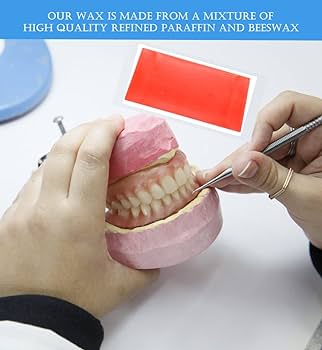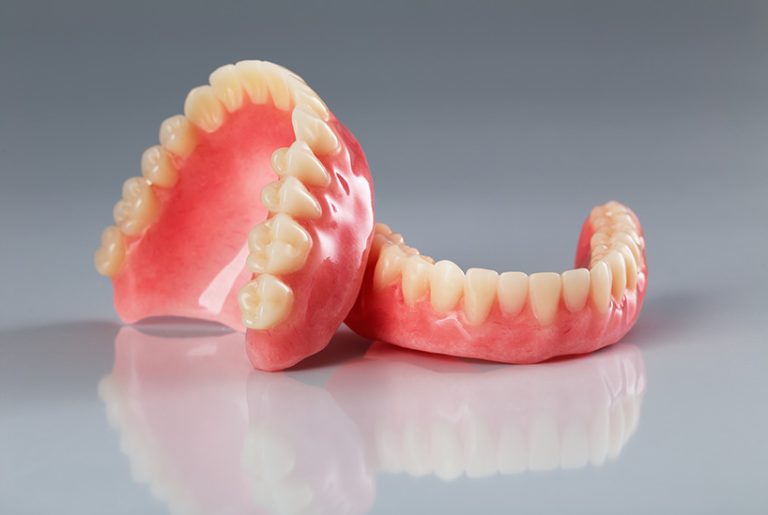Last Updated on 3 days by Dr. Michelle G. Brito
Dentures are often thought of as being uncomfortable and in the way, but many people don’t realize that you can sleep with them. There are a few things you need to keep in mind, however, to make sure that your Dentures don’t cause any problems while you’re asleep. First, be sure to clean your Dentures before going to bed.
Second, use a denture adhesive to secure your Dentures in place. This will prevent them from moving around or falling out during the night.
Finally, try to sleep on your back or side rather than your stomach. This will help keep your Dentures from rubbing against your cheeks or gums and causing discomfort.
- Wash or brush your dentures clearly after dinner.
- Food particles or debris will be cleared.
- Fill a cup with water and place it on your nightstand next to your bed.
- This way, you can easily reach for your dentures if you need to take them out during the night.
- When you’re ready to go to sleep, take out your dentures and brush them lightly with a soft-bristled toothbrush
- Be sure to rinse them off afterward.
- Place your dentures in the cup of water on your nightstand and make sure they’re entirely covered with water.
- This will help keep them from drying out overnight.
- If you wake up during the night and need to take out your dentures, be sure to rinse them off before putting them back in your mouth
Can You Sleep with a Full Set of Dentures?
Yes, you can sleep in your dentures. However, it is vital to take them out and clean them before going to bed. It is also essential to brush your teeth and gums before putting your dentures back in.
Can Denture Wearable Full 24 Hours?
It is recommended that you wear your dentures for a minimum of four hours per day. This gives your gums and bones time to adjust to the new dental appliance. Additionally, it allows your mouth to produce the necessary saliva to keep your dentures clean and free of bacteria.
Sleeping With Dentures Is Good Or Bad?
The answer is people’s individual choice. Some people find that sleeping with their dentures in is more comfortable, while others find that sleeping without them allows their gums to breathe and prevents any irritation. Ultimately, it is up to the individual to decide what works best for them.
Can You Take a Nap With Dentures?

There is no definitive answer to this question as it depends on the individual and how they feel about taking a nap with their dentures in. Some people find that they can take a nap without any issues, while others may find that their dentures make it difficult to sleep comfortably. It’s the patient’s choice and experimental things.
If you do decide to take a nap with your dentures in, be sure to brush them before bed so that you wake up feeling refreshed and ready to start your day!
Sleeping in your Dentures? Can it cause health problems? – Dr. Shahul Hameed| Doctors’ Circle
What Happens If You Sleep With Dentures
If you sleep with your dentures in, you may be at risk for several problems. Dentures can cause gum irritation and sores, and if they are not cleaned properly, they can also lead to infection. In addition, sleeping with dentures in can alter the fit of the denture, causing it to become loose and uncomfortable.
If you do choose to sleep with your denture in, be sure to clean it well before bed and check for any signs of irritation or soreness.
Types Of Dentures?
If you are missing all of your teeth, or if you are about to have all of your teeth extracted, you may be wondering if there is a type of denture that you can wear all the time. The answer is yes! Two types of dentures can be worn 24 hours a day, seven days a week: conventional full dentures and implant-supported dentures.
Conventional full dentures are made to fit snugly over your gums. They rely on suction to stay in place, and they need to be removed nightly so that your gums can rest. Implant-supported dentures are much more secure because they are anchored into your jawbone by dental implants.
This means that they won’t slip or move around in your mouth, and you don’t have to take them out at night. If you want to wear your dentures all the time, implant-supported dentures are the way to go. However, they do require surgery to place the implants, so they are not suitable for everyone.
If you decide that implant-supported dentures are fitting for you, talk to your dentist about getting started with the process.
First Week With Dentures
Dentures can be a bit overwhelming at first, but with a little care and patience, you’ll be enjoying your new smile in no time! Here are a few things to keep in mind during your first week with dentures:
1. It’s slow to match your mouth early. Your mouth will need some time to adjust to the new dentures, so take it easy at first. Avoid hard or chewy foods, and stick to soft items like mashed potatoes or soup.
2. Be careful with hot liquids. It’s vital to let hot drinks cool down before sipping them, as the heat can cause the dentures to warp slightly. This isn’t permanent, but it can be uncomfortable if it happens.
3. Spit out toothpaste when brushing. Unlike natural teeth, which have roots that anchor them in place, dentures rely on suction to stay put. When you’re brushing your teeth, make sure to spit out any toothpaste that accumulates around the base of the denture so that it doesn’t loosen them up while you’re sleeping!
4. Keep them clean. Just like natural teeth, dentures need to be brushed daily (preferably after each meal) using a soft-bristled brush and non-abrasive toothpaste. In addition, soak them overnight in a mild cleansing solution to help remove any plaque or food particles that may have become trapped under the appliance.
After Some Week Can I Sleep Without My Dentures?
If you’re thinking about ditching your dentures, you’re probably wondering how soon you can sleep without them. After all, it’s not exactly comfortable to sleep with a mouth full of fake teeth. The good news is that you don’t have to wait very long to ditch the dentures and get a good night’s sleep.
Most people can take their dentures out within a few days of getting them. However, it’s essential to give your gums and mouth time to adjust to the new teeth. Sleeping without your dentures will help your mouth get used to the new teeth faster.
Of course, there are a few things you need to do before you can take your dentures out at night. First, make sure you brush and floss your teeth thoroughly. You don’t want food particles or plaque to build up on your new teeth.
Second, use mild soap and water to clean your dentures before bedtime. Finally, be sure to put your dentures in a safe place where they won’t get lost or damaged while you’re sleeping without them.
Once you’ve taken care of these things, take out your dentures before going to bed and enjoy a good night’s sleep!
Can You Sleep With Upper Dentures in?
If you have upper dentures, you may be wondering if it is safe to sleep with them. The short answer is yes, you can sleep with your upper dentures in. But follow these rules-
First, make sure that your dentures fit well and are not loose. If they are flexible, they could shift during the night and cause discomfort or even pain. Second, avoid sleeping on your stomach if possible.
This can put pressure on your dentures and cause them to shift. We have advice that sleep on your back or side. Finally, be sure to clean your dentures before going to bed.
This will help remove any food particles or bacteria that could cause problems while you sleep. If you follow these tips, you should be able to sleep comfortably with your upper dentures in place.
Can Dentures be kept in a cool or dry place?
There are a few things to consider when deciding whether to put your dentures in wet or dry. The first is what type of denture you have. If you have a complete denture, it will need to be soaked in water before being inserted.
This helps to keep the denture from drying out and becoming brittle. If you have a partial denture, you can choose to either soak it or not. However, if your partial has metal clasps, it’s essential to make sure they don’t rust by soaking the denture.
The second thing to consider is your comfort level. Some people find that wetting their dentures makes them easier to insert and remove. Others find that having damp gums helps keep their prosthesis in place throughout the day.
There’s no right or wrong answer here – it’s all about what works best for you! If you do decide to soak your dentures, there are a few things to keep in mind. First, use lukewarm water – hot water can damage the material of your dentures over time.
Second, use a mild soap or detergent-free cleanser designed specifically for cleaning dental appliances. Third, rinse your dentures thoroughly before putting them back in your mouth. You don’t want any soapy residue left behind!
Finally, be sure to store your damp dentures in a clean container with enough water to cover them completely. This will help keep them from drying out overnight.
What Happens If You Wear Your Dentures All the Time
If you wear your dentures all the time, you may be at risk for some severe problems. First, you can develop sores and infections in your mouth if your dentures are not cleaned properly. Additionally, wearing dentures all the time can cause your gums to shrink, which can make it difficult to eat and speak.
Finally, you need to take care of your dentures to avoid them becoming stained and discolored.
Should You Keep Dentures in Water Overnight
If you’re like most people, take your dentures out at night and soak them in water. But is this really the best thing to do? Here’s what you need to know about soaking dentures overnight:
1. It’s essential to use clean water. Bacteria can grow in dirty water, so be sure to use fresh water each night.
2. Soaking dentures in water helps to keep them moist and prevents them from drying out. This is especially important if you live in a dry climate.
3. It’s a good idea to add a little bit of vinegar to the water. This will help kill any bacteria that might be growing on your dentures.
4. Never use hot water, as this can damage your dentures. Room temperature or cool water is best. 5. After soaking, be sure to brush your dentures before putting them back in your mouth.
Conclusion
If you’re considering sleeping with your dentures in, you may be wondering if it’s safe. The answer is yes, you can sleep with dentures in, but there are a few things you should keep in mind. First, make sure your dentures fit well and are comfortable.
Otherwise, you may experience discomfort or pain. Second, be sure to clean your dentures before going to bed to avoid bacteria buildup. And finally, consider using a denture adhesive to help keep your dentures in place overnight.




